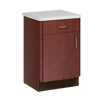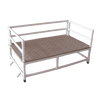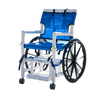Understanding & Managing Seasonal Affective Disorder (SAD) in Seniors

Seasonal Affective Disorder (SAD) is a type of depression that typically occurs during the darker months of winter. It is crucial for seniors and their caregivers to recognize the symptoms and understand the treatment options to manage this condition effectively.
Understanding SAD
SAD is more than just "winter blues"; it is a recognized cyclical disorder that significantly impacts mood, energy, and daily activities. Symptoms include persistent low mood, lack of energy, and disinterest in life, usually during the winter months (NIMH).
Light Therapy: A Bright Solution
Light therapy is an effective treatment for SAD, involving exposure to bright light every morning to help regulate the body's sleep-wake cycle and improve mood. This treatment is particularly beneficial for seniors who may spend extended periods indoors (Mayo Clinic).

Staying Active
Maintaining an active lifestyle is vital in combating the symptoms of SAD. Regular physical activity, especially outdoors, can increase sunlight exposure and boost endorphins, which improve mood and energy levels (Mayo Clinic).
Dietary Adjustments
Incorporating certain nutrients can alleviate symptoms of SAD. Omega-3 fatty acids and vitamin D are particularly beneficial, helping to improve overall mood and energy levels (Good Samaritan Society).
Enhanced Strategies for Managing SAD
- Self-Care Techniques: Enhancing the amount of sunlight in one’s living space and spending more time outdoors can be helpful. Regular exercise and establishing a consistent sleep schedule are also beneficial for managing symptoms.
- Psychotherapy and Medication: In some cases, talking therapies like cognitive-behavioral therapy or medication such as antidepressants might be recommended depending on the severity of the symptoms (Mayo Clinic).
- Social Interaction: Encouraging social interaction and participating in community activities can help alleviate feelings of isolation and depression associated with SAD (Good Samaritan Society).
Conclusion
Understanding and addressing Seasonal Affective Disorder in seniors is crucial for maintaining mental health during the colder months. By employing strategies like light therapy, maintaining an active lifestyle, making dietary adjustments, and utilizing self-care techniques, seniors can manage the symptoms of SAD more effectively and enjoy a higher quality of life.
Visit Dansons Medical for a range of high-quality and reliable medical equipment and resources to support senior health. Let us be your partners in promoting a healthier and more comfortable lifestyle for seniors.
- Dansons Medical Support


 Lifts
Lifts
 Patient Lifts
Patient Lifts
 Stand Assists
Stand Assists
 Standing Aids
Standing Aids
 Slings
Slings
 Parts & Accessories
Parts & Accessories
 Wheelchairs
Wheelchairs
 Ergonomic
Ergonomic
 Portable
Portable
 Reclining
Reclining
 Standing
Standing
 Sporting
Sporting
 Bariatric
Bariatric
 Ramps
Ramps
 Modular
Modular
 Portable
Portable
 Parts & Accessories
Parts & Accessories
 Walking Aids
Walking Aids
 Rollator Walkers
Rollator Walkers
 Canes
Canes
 Crutches
Crutches
 Parts & Accessories
Parts & Accessories
 Scooters
Scooters
 4-Wheel
4-Wheel
 Folding
Folding
 Parts & Accessories
Parts & Accessories
 Nursing
Nursing
 Pregnancy Comfort
Pregnancy Comfort
 Self-Care
Self-Care
 Pump Parts
Pump Parts
 Exercise Equipment
Exercise Equipment
 Treadmills
Treadmills
 Walking Pads
Walking Pads
 Rowing Machines
Rowing Machines
 Strength & Conditioning
Strength & Conditioning
 Massage Chairs
Massage Chairs
 Saunas
Saunas
 Hot & Cold Tubs
Hot & Cold Tubs
 Stethoscopes
Stethoscopes
 Surgical Instruments
Surgical Instruments
 Forceps
Forceps
 Scalpels
Scalpels
 IV Poles
IV Poles
 Oxygen
Oxygen
 Beds
Beds
 Electric Beds
Electric Beds
 Standing Beds
Standing Beds
 Mattresses
Mattresses
 Bed Accessories
Bed Accessories
 Bed Parts
Bed Parts
 Chairs
Chairs
 Medical Recliners
Medical Recliners
 Phlebotomy Chairs
Phlebotomy Chairs
 Stools & Task Chairs
Stools & Task Chairs
 Parts & Accessories
Parts & Accessories
 Tables
Tables
 Overbed Tables
Overbed Tables
 Medical Tables
Medical Tables
 Recovery Couches
Recovery Couches
 Cabinets
Cabinets
 Pool
Pool
 Pool Lifts
Pool Lifts
 Pool Fitness & Therapy
Pool Fitness & Therapy
 Pool Access Chairs
Pool Access Chairs
 Slings
Slings
 Parts & Accessories
Parts & Accessories
 Bath
Bath
 Toileting Aids
Toileting Aids
 Bath Lifts
Bath Lifts
 Shower Seats
Shower Seats
 Parts & Accessories
Parts & Accessories
 Portable Shower
Portable Shower
 Dansons Products
Dansons Products
 Transfer Aids
Transfer Aids
 Cushions
Cushions
 eBooks
eBooks
 Helpful Articles
Helpful Articles
 Reviews
Reviews
 Contact Us
Contact Us
 Create Account
Create Account
 Request a Quote
Request a Quote

Comments 0